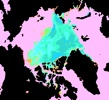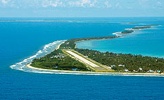 Readers with functioning short term memories may recall that my local lines company, Mainpower, through its Local Generation subsidiary is planning to build a wind farm on Mt Cass, looking down over the Waipara Valley. The site (or a large chunk of it) can be seen from the comfy chairs on my veranda, testing my commitment to low carbon energy and landscape aesthetics. To help me (and others) come to terms with what this means, Mainpower’s main wind energy people, Andrew Hurley and Todd Mead, have launched a blog covering the planning and development process. It promises to give an interesting insight into the way wind farms are developed, and already demonstrates a refreshing openness about the process. Andrew’s commented here on wind issues, and has been up to Limestone Hills to talk climate blogs and wind, so I wish them luck with their new venture. Not sure about the turbines on the skyline though… 😉
Readers with functioning short term memories may recall that my local lines company, Mainpower, through its Local Generation subsidiary is planning to build a wind farm on Mt Cass, looking down over the Waipara Valley. The site (or a large chunk of it) can be seen from the comfy chairs on my veranda, testing my commitment to low carbon energy and landscape aesthetics. To help me (and others) come to terms with what this means, Mainpower’s main wind energy people, Andrew Hurley and Todd Mead, have launched a blog covering the planning and development process. It promises to give an interesting insight into the way wind farms are developed, and already demonstrates a refreshing openness about the process. Andrew’s commented here on wind issues, and has been up to Limestone Hills to talk climate blogs and wind, so I wish them luck with their new venture. Not sure about the turbines on the skyline though… 😉
Tag: Topic
First forecast for the next ten years
 Researchers at the Hadley Centre in Britain have produced the world’s first short range climate forecast, covering the next ten years. And there are no surprises, it’s going to get warmer. From New Scientist:
Researchers at the Hadley Centre in Britain have produced the world’s first short range climate forecast, covering the next ten years. And there are no surprises, it’s going to get warmer. From New Scientist:
Although average global temperatures have been relatively flat in recent years, the model says they will start rising again next year. At least half of the years between 2009 and 2015 will exceed the current warmest year on record. By 2015, global temperatures will be 0.5 °C above the average value for the last 30 years.
Arctic ice sets new record
 I follow the Arctic sea ice extent at Cryosphere Today. The site publishes pictures, maps and graphs of sea ice in the Arctic and Antarctic, derived from NASA satellite data. They’ve just announced a worrying new record:
I follow the Arctic sea ice extent at Cryosphere Today. The site publishes pictures, maps and graphs of sea ice in the Arctic and Antarctic, derived from NASA satellite data. They’ve just announced a worrying new record:
Today (August 9th), the Northern Hemisphere sea ice area broke the record for the lowest recorded ice area in recorded history. The new record came a full month before the historic summer minimum typically occurs. There is still a month or more of melt likely this year. It is therefore almost certain that the previous 2005 record will be annihilated by the final 2007 annual minima closer to the end of this summer. In previous record sea ice minima years, ice area anomalies were confined to certain sectors (N. Atlantic, Beaufort/Bering Sea, etc). The character of 2007’s sea ice melt is unique in that it is dramatic and covers the entire Arctic sector. Atlantic, Pacific and even the central Arctic sectors are showing large negative sea ice area anomalies.
I find this news disturbing for two reasons. First, the fact that the new record should be set so early in the season. That suggests that there is a lot more melting to go. The second is the language: normally cautious scientists seldom use words like “annihilate
Grape expectations
 Winemakers in Australia and South Africa are worried about the impact of warming on their wines. In Australia, a new report [Stuff] suggests that grape quality will be hit badly, unless the industry adapts by moving to cooler areas or by planting hot climate varieties. And Canada’s Globe & Mail reports on South African concerns:
Winemakers in Australia and South Africa are worried about the impact of warming on their wines. In Australia, a new report [Stuff] suggests that grape quality will be hit badly, unless the industry adapts by moving to cooler areas or by planting hot climate varieties. And Canada’s Globe & Mail reports on South African concerns:
It’s getting too hot, and too wet (at the wrong times) in the key wine-growing region, and the flagship but fragile sauvignon blanc has been the first, but not the last, to suffer. It’s a harsh blow, first, because after years of sanctions in the apartheid era, the country has gradually been winning more market share for its wines (just under 3 per cent globally, last year.) and its wines have garnered more critical acclaim as well.
Luckily, I planted some syrah…
[Added 10/8/07: Interesting perspective on changes in Spanish viticulture in response to climate change from National Public Radio in the USA.]
Tuvalu sunk by pineapples
 The NZCSC has been trumpeting the arrival in New Zealand of professor (emeritus) Nils-Axel Mörner, “a leading world authority on sea levels and coastal erosion”. Prof Mörner’s mission? To reassure us that sea level rise is not happening. Mörner first takes the ritual swipe at An Inconvenient Truth:
The NZCSC has been trumpeting the arrival in New Zealand of professor (emeritus) Nils-Axel Mörner, “a leading world authority on sea levels and coastal erosion”. Prof Mörner’s mission? To reassure us that sea level rise is not happening. Mörner first takes the ritual swipe at An Inconvenient Truth:
I can assure you there have been no rises in sea levels, so you should ask yourselves how much else of what Gore says is similarly false?
